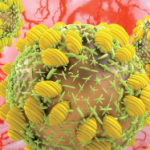Hepatitis-C virus (HCV)-associated arthritis is highlighted this month in our ongoing series on patient education materials.
Physicians need to address HCV and the rheumatic manifestations associated with the disease, according to Kristine M. Lohr, MD, chair of the ACR Patient Education Task Force. “Chronic hepatitis-C virus is the most common cause of chronic liver disease and reason for liver transplantation in the U.S.,” she says. “In one study of chronic HCV infection, more than one-third of patients had clinical extrahepatic manifestations. Arthritis occurs in up to 20% of HCV patients; the majority [of cases mimic] rheumatoid arthritis and the remainder, oligoarthritis. Mixed cryoglobulinemia is seen in about half of chronic HCV. Patients with these and other rheumatic complaints, such as Raynaud’s phenomenon and SICCA syndrome, should be screened for HCV to ensure accurate diagnosis and appropriate therapy.”
Points to remember about HCV-associated arthritis from fact sheet author Pierre Miossec, MD:
- Any musculoskeletal syndrome can be the consequence of an HCV infection, even in the absence of hepatitis;
- HCV-associated rheumatic disease may occur before HCV infection diagnosis; and
- Treatments for these manifestations do exist, but are best used in the context of a multidisciplinary interaction between physicians taking care of the patient.
For more detailed information about HCV-associated arthritis or to download the fact sheet, visit www.rheumatology.org/public/factsheets. Coming next month: Paget’s disease.
